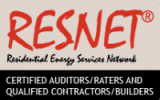In your search for a new home, there are endless factors to keep in mind. Consider total budget, rental costs, pet agreements, moving options, commute to work, the number of bedrooms and bathrooms, square footage, and the list goes on. As you check off these boxes, you become closer to closing the gap between you and your ideal living space. However, one important factor that is often overlooked by potential tenants and landlords alike is the energy efficiency of a Colorado home. Energy efficiency questions help you determine future costs.
Cost of Living
The amount of energy consumed by a home has a significant impact on your cost of living. By purchasing an energy efficient home, you could be saving a notable amount of money each month.
Advantage of an Energy-Efficient Home
If you are interested in saving money and lightening your burden on the environment by investing in an energy-efficient home, it is important to understand what questions will help you move forward in the home searching process with your landlord or real estate agent.
How Old Are the Appliances, and What are Their Energy Star Ratings?
Energy Star evaluates appliances based on how much energy they use. Because household appliances are some of the largest electricity guzzlers in the home if your home comes will already-installed appliances, it will be important to know how old they are and what their efficiency ratings are. More often than not, newer appliances will use less energy and have better efficiency ratings.
Updating Older Models
If you are renting a space and the included appliances are substantially older, you may want to consider asking your landlord if the appliances can be updated and replaced with more energy efficient models. Depending on the living situation, this may or may not be possible, but it never hurts to ask!
How Old is the Heating and Cooling System, and What Is Its Efficiency Rating?
Efficiency ratings refer to the ideal amount of energy consumption by a system in factory conditions. The efficiency rating of your heating and cooling system will help give you an idea of how much energy your system will use, and how effective it will actually be at regulating a building’s temperature. If the system cannot effectively distribute hot or cold air throughout the building or loses this air in the process of distributing it, the heating and cooling system is wasting energy and costing tenants excessive amounts of cash.
The Higher, The Better
The higher the efficiency rating, the better, but keep in mind that old systems may not be holding up to their original efficiency ratings.
Who Covers the Costs of Maintenance and Repairs?
When a system or appliance needs maintenance or repair, who is responsible for covering the cost? If the renter is responsible for covering the burden of repair costs, landlords often do not feel compelled to ensure that systems are high-functioning and energy efficient.
Everyone Wants to Save Money
However, if the responsibility for maintenance and repair costs belongs to the landlord, it is far more likely that your living space will be updated with energy-efficient systems of high quality since it will save them more money.
What is the R-value (insulation level) of the Home?
The “R-value,” or insulation value, of a home, will determine how well your living space keeps hot and/or cold air in your house. Minimalistic design elements like exposed brick may be aesthetically appealing, but brick has a poor insulation level; this will especially become a problem if the exposed brick is located on an outside wall. Glass and certain stones also have poor insulation levels.
The Outside Matters
It also helps to know how the outside walls of your home are insulated, and what its insulation value is. Settle for no less than an R-value of at least twenty. In many cases, this is a coded requirement, but if for some reason your insulation falls below this level, you and/or your landlord are needlessly wasting money on heating and cooling that is escaping your home.
Does this Home have Single- or Double-Paned Windows?
Single-pane windows let out an excessive amount of heat; double-pane windows help keep the hot air you pay for inside your home.
Benefits of Upgrading
Older homes will often have single panes, but upgrading them will more often than not increase the home’s value in the long run. If the home you live in does have single panes that cannot be replaced, window shrink wrap can help compensate by acting as a second pane, adding an extra barrier to keep the air inside your home.
Does this House Receive Natural Light?
A healthy number of windows can keep your home’s rooms well-lit and even reduce the cost of your heating bills.
Added Benefits
An additional perk is that a well-lit home with natural lighting is associated with certain health benefits that you miss out on with artificial lighting.
Can We Make Sure This Living Space Is As Energy Efficient As Possible?
Being straightforward with your landlord will help you work together as a team, helping both parties save money and lessen the home’s environmental impact.
Good Landlords, Good Tenants
Furthermore, good landlords desire to rent out properties to good tenants. By directly asking this question, and all those listed above, you make it clear that you care about the quality of the space you are living in. This level of concern gives a landlord peace of mind that you will take care of the home while you are living there.
In your quest for a more energy efficient home, these questions will help you and your landlord work together as a team, cutting costs, decreasing environmental impact and increasing value. Talk to your landlord about scheduling a home energy audit to find no-cost and low-cost ways to go green and reduce monthly utility bills.
Thank you for reading our blog! How can we help you? Contact us today.



